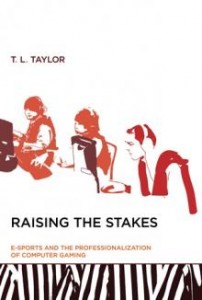Sociologist Examines the World of Professional Video Gaming
-
-
slice.mit.edu
Filed Under
Recommended
 T.L. Taylor's latest book
T.L. Taylor's latest book
T.L. Taylor studies the world of sports—specifically, the world of esports, which refers to the competitive gaming scene, from computer games like StarCraft II to video games like Street Fighter. Events like the Evo Championship Series and the GUTS Tournament, which the MIT Game Lab co-hosted last summer, have risen in popularity over the past decade.
But will video games ever be seen as a real sport? Even the players don't agree on whether "esports" is an appropriate moniker for their activity, according to Taylor.
"In esports, that's been one of the fascinating tensions over the years," Taylor tells Slice in an interview. "[Sports] often works as a legitimizing term because it taps into something that's culturally recognizable, but in my experience, there have always been a number of people in the scene who've been uncomfortable with it because they've been put off by 'jock culture,' 'sport culture' baggage, or growing commercialization, and they don't want anything to do with it."
It's too late to put the genie back into the bottle now, though. Spectatorship of high-level competitive play has surged, in part because video-hosting services like YouTube and Twitch provide more opportunities for viewers to keep up with their favorite players. Gaming as a past-time has begun to seem more accessible and less obscure as a result.
"Spectatorship as an important focal point has been on the rise in the last few years," Taylor affirms. "My next project is on live-streaming ... While it used to take real work to watch a match, it's so easy now to spectate live, and online."
MIT students also participate in competitive gaming, including MIT StarLeague for StarCraft II players. The Collegiate Starleague Twitch channel began with a 2009 match between MIT and Princeton students; the channel now hosts online tournaments between college teams across the continent. Hyun Soo Kim '09, one of the original MIT StarLeague members, went on to play StarCraft II professionally. He's not the only MIT alum with pro-gaming chops, either; David Sirlin '98 was a Street Fighter pro who went on to pursue a career in game design.To learn more about the history of competitive gaming, buy T.L. Taylor's book, Raising the Stakes: E-Sports and the Professionalization of Computer Gaming.







